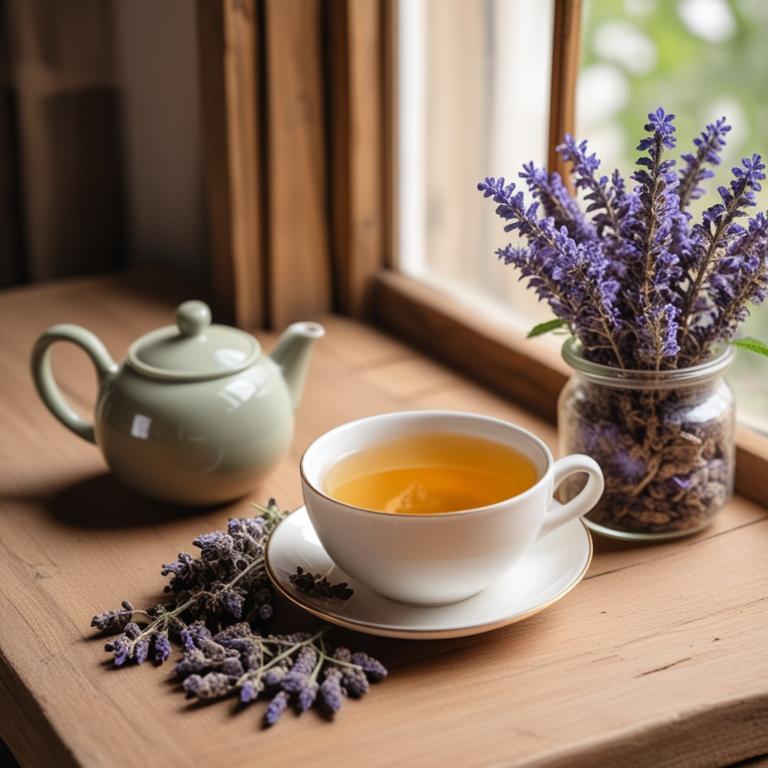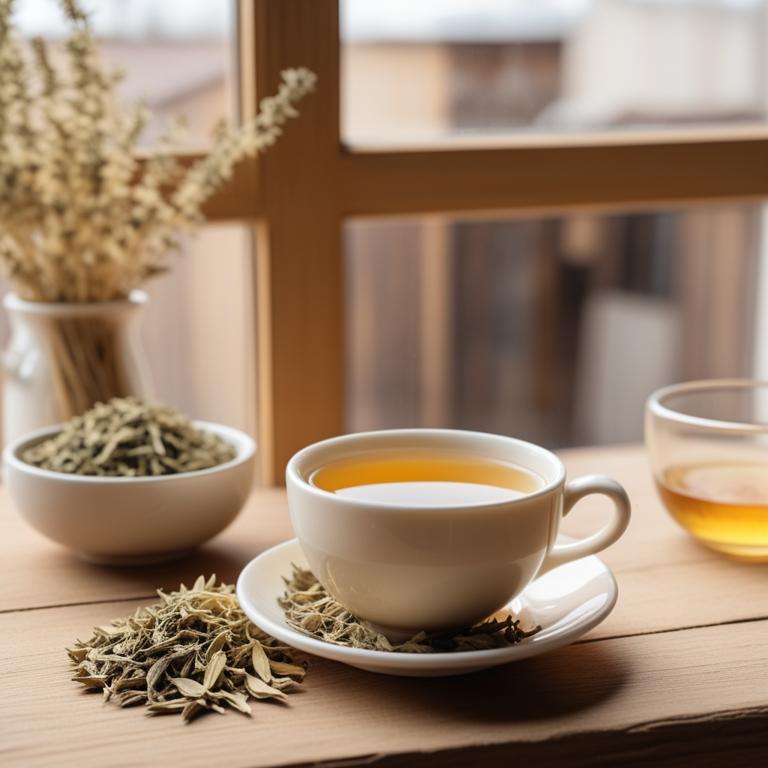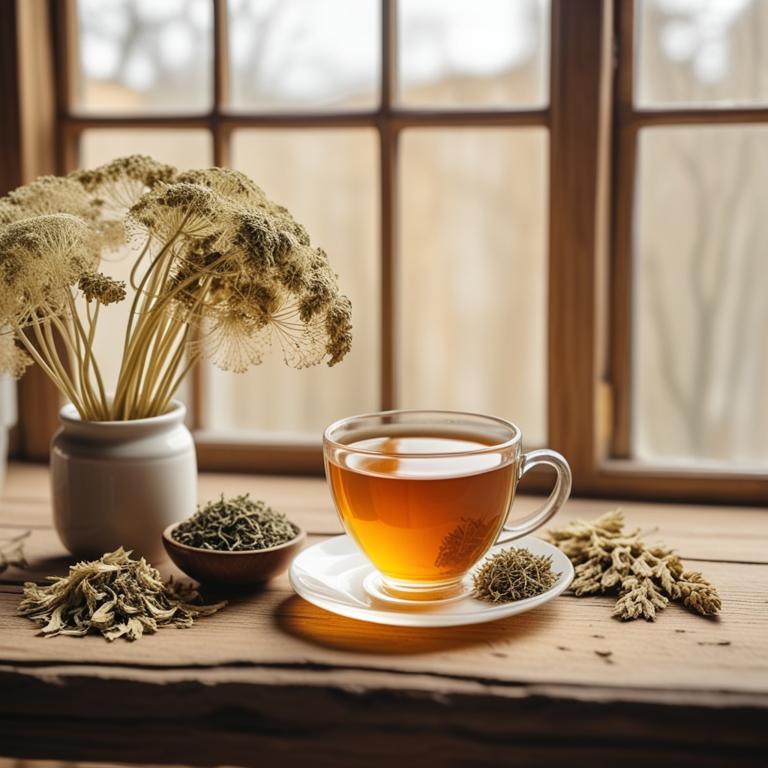10 Herbal Teas For Osteoporosis

Herbal teas have been used for centuries to help alleviate the symptoms of osteoporosis, a condition where the bones become weak and brittle.
This is because many herbs contain powerful compounds that help to strengthen bones and improve bone density. For example, Curcuma longa, also known as turmeric, contains a compound called curcumin, which has potent anti-inflammatory and antioxidant properties. Curcumin helps to reduce inflammation in the body, which can contribute to bone loss, and also helps to stimulate bone growth. Ginkgo biloba, another herb commonly used in herbal teas, has been shown to improve bone density by increasing the production of osteoblasts, cells that help to build new bone tissue. This can help to reduce the risk of fractures and other bone-related problems.
Zingiber officinale, or ginger, has also been found to have a positive effect on bone health, by increasing the production of collagen, a protein that gives bones their strength and flexibility. Drinking herbal teas containing these herbs can bring many benefits to your life. For one, it can help to reduce the risk of fractures and other bone-related problems, giving you more freedom to move and engage in activities you enjoy. Additionally, these teas can help to reduce inflammation and improve overall health, which can reduce the risk of other diseases and conditions. They can also be a soothing and comforting way to relax and unwind, especially when consumed before bed.
As with any herbal remedy, it's essential to consult with a healthcare professional before starting to drink these teas, especially if you have any underlying health conditions or are taking medications.
- 1. Curcuma longa
- 2. Ginkgo biloba
- 3. Zingiber officinale
- 4. Astragalus membranaceus
- 5. Rosmarinus officinalis
- 6. Angelica sinensis
- 7. Glycyrrhiza glabra
- 8. Equisetum arvense
- 9. Panax ginseng
- 10. Vitex agnus-castus
1. Curcuma longa

Curcuma longa teas contains bioactive constituents such as curcumin, demethoxycurcumin, and bisdemethoxycurcumin.
Curcumin, in particular, has potent anti-inflammatory and antioxidant properties, which are beneficial for osteoporosis. Curcumin's ability to inhibit the production of inflammatory cytokines and enzymes helps to reduce bone resorption and promote bone formation. Additionally, curcumin's antioxidant properties help to protect bones from oxidative stress and damage caused by free radicals.
Regular consumption of Curcuma longa teas may help to improve bone density and reduce the risk of osteoporosis-related fractures.
- Gather 1 cup of water and 1 tablespoon of dried turmeric root (Curcuma longa) in a pot.
- Heat the water in the pot over medium heat until it starts to boil.
- Reduce the heat to low and add the turmeric root to the boiling water.
- Let the mixture simmer for 5-7 minutes, then strain it into a cup using a tea strainer.
- Drink the tea immediately, ideally on an empty stomach, and repeat as directed by a healthcare professional.
2. Ginkgo biloba

Ginkgo biloba teas contains flavonoids and bilobalide, two active constituents that help improve blood flow to the bones.
This increased blood flow brings essential nutrients and minerals to the bones, which is crucial for maintaining bone density. The flavonoids in Ginkgo biloba also have antioxidant properties, which help protect bones from oxidative stress and damage. Additionally, the tea's anti-inflammatory properties may help reduce inflammation in the bones, a common factor in osteoporosis.
By improving blood flow, reducing inflammation, and protecting bones from damage, Ginkgo biloba teas may play a role in supporting bone health.
- Gather 1 cup of boiling water, 1 teaspoon of dried Ginkgo biloba leaves, and a tea infuser.
- Place the Ginkgo biloba leaves in the tea infuser.
- Steep the leaves in the boiling water for 5-7 minutes.
- Strain the tea into a cup and discard the leaves.
- Drink 1 cup of the Ginkgo biloba tea 2-3 times a day for osteoporosis relief.
3. Zingiber officinale

Zingiber officinale teas contains compounds like gingerols and shogaols, which are bioactive constituents that have anti-inflammatory and antioxidant properties.
These properties help reduce inflammation in the body, which is often associated with osteoporosis. Gingerols, particularly 6-gingerol, have been shown to stimulate osteoblasts, the cells responsible for bone formation. Shogaols, on the other hand, have been found to inhibit the activity of osteoclasts, the cells that break down bone tissue.
By balancing the activity of these cells, Zingiber officinale teas may help promote bone density and reduce the risk of osteoporosis.
- Gather 1 teaspoon of dried Zingiber officinale root, 1 cup of boiling water, and a tea infuser or strainer.
- Place the dried root in the tea infuser or strainer.
- Pour the boiling water over the root and let it steep for 5-7 minutes.
- Strain the tea and discard the root. Add honey or lemon to taste, if desired.
- Drink the tea 2-3 times a day, ideally with meals, to help alleviate osteoporosis symptoms.
Zingiber Officinale Tea on Amazon
FGO Organic Ginger Tea, 100 Count, Eco-Conscious Tea Bags, Caffeine Free, Packaging May Vary (Pack of 1)
Disclaimer: We earn a commission if you click this link and make a purchase at no additional cost to you.
4. Astragalus membranaceus

Astragalus membranaceus teas contains isoflavones and astragalosides, which are its key active constituents.
These compounds have anti-inflammatory properties, which help to reduce inflammation in the bones and joints. Astragalosides also have antioxidant properties, which protect bones from damage caused by free radicals. The tea's flavonoids, including kaempferol and quercetin, help to improve bone density by enhancing the activity of osteoblasts, the cells responsible for bone growth.
By reducing inflammation and promoting bone growth, Astragalus membranaceus teas may help to alleviate symptoms of osteoporosis.
- Gather Astragalus membranaceus dried root (1 tablespoon) and a cup of water.
- Boil the water in a pot. Remove from heat when it reaches a boil.
- Add the dried Astragalus membranaceus root to the boiling water. Let it steep for 5-7 minutes.
- Strain the tea into a cup using a strainer or cheesecloth. Discard the root.
- Drink the tea 2-3 times a day for optimal benefits. Consult a doctor before using it to treat osteoporosis.
5. Rosmarinus officinalis

Rosmarinus officinalis teas contains bioactive compounds such as carnosic acid and rosmarinic acid, which have antioxidant and anti-inflammatory properties.
These compounds help protect bones by reducing oxidative stress and inflammation, which can contribute to bone loss and osteoporosis. The antioxidants in Rosmarinus officinalis teas also have the ability to neutralize free radicals, which can damage bone cells and tissues. Additionally, rosmarinic acid has been shown to inhibit the activity of osteoclasts, which are cells that break down bone tissue, thereby helping to preserve bone density.
By reducing inflammation and oxidative stress, and inhibiting osteoclast activity, Rosmarinus officinalis teas may help support bone health and potentially alleviate symptoms of osteoporosis.
- Gather 1 cup of fresh Rosmarinus officinalis leaves or 1 teaspoon of dried leaves.
- Heat 1 cup of water in a pot until it boils.
- Add the Rosmarinus officinalis leaves to the boiling water and let it steep for 5-7 minutes.
- Strain the tea into a cup and discard the leaves.
- Drink the tea 2-3 times a day to help reduce osteoporosis symptoms, ideally with a meal containing calcium and vitamin D.
6. Angelica sinensis

Angelica sinensis teas contains bioactive constituents like ferulic acid and polysaccharides, which have been shown to have anti-inflammatory and antioxidant properties.
These properties are helpful in reducing bone resorption and promoting bone formation, which can lead to improved bone density. The tea also contains angelica acid and ligustilide, which have been found to stimulate the production of osteoblasts, the cells responsible for bone growth. Additionally, the tea's ferulic acid content has been shown to inhibit the activity of osteoclasts, the cells that break down bone tissue.
By reducing bone resorption and promoting bone growth, Angelica sinensis teas may help alleviate symptoms of osteoporosis.
- Gather 2 tablespoons of dried Angelica sinensis root and 1 cup of water.
- Boil the water in a pot and pour it into a tea infuser or a heat-resistant cup.
- Add the dried Angelica sinensis root to the boiling water and let it steep for 5-7 minutes.
- Strain the tea into another cup using a tea strainer or cheesecloth, and discard the solids.
- Drink 1-2 cups of the Angelica sinensis tea per day, ideally before meals, for optimal benefits.
7. Glycyrrhiza glabra

Glycyrrhiza glabra teas contains bioactive constituents like glycyrrhizin and saponins, which have anti-inflammatory properties.
These compounds help to reduce inflammation in the body, which is a major contributor to osteoporosis. Glycyrrhizin also helps to increase calcium levels in the bones, which is essential for bone health. The saponins in Glycyrrhiza glabra teas have been shown to stimulate the activity of osteoblasts, cells that help to build bone tissue.
Regular consumption of Glycyrrhiza glabra teas may help to slow down bone loss and improve bone density in individuals with osteoporosis.
- Gather 1 cup of fresh or dried Glycyrrhiza glabra roots and 4 cups of water.
- Chop the roots into small pieces and boil them in 4 cups of water for 10-15 minutes.
- Strain the mixture through a cheesecloth or a fine-mesh sieve into a large cup or teapot.
- Add 1 tablespoon of honey (optional) to the tea and stir well to dissolve.
- Drink the tea 2-3 times a day for 2-3 months, or as directed by a healthcare professional.
8. Equisetum arvense

Equisetum arvense teas contains bioactive constituents such as ferulic acid, caffeic acid, and sinapic acid.
These compounds have anti-inflammatory properties that help reduce inflammation in the body, which is often associated with osteoporosis. The tea also contains equisetic acid, which has been shown to stimulate bone growth and improve bone density. Additionally, the tea's high levels of flavonoids, including isoorientin and isovitexin, help protect bones from damage caused by oxidative stress.
By reducing inflammation and promoting bone growth, Equisetum arvense teas may help alleviate symptoms of osteoporosis.
- Gather 2 cups of fresh Equisetum arvense leaves and stems.
- Wash the Equisetum arvense leaves and stems with cold water to remove dirt.
- Combine 1 cup of the Equisetum arvense leaves and stems with 2 cups of boiling water in a pot.
- Steep the mixture for 5-7 minutes, then strain it into a cup.
- Drink 1/2 cup of the Equisetum arvense tea 2-3 times a day for osteoporosis relief.
9. Panax ginseng

Panax ginseng teas contains bioactive constituents like ginsenosides, which are compounds that help with bone health.
These ginsenosides have anti-inflammatory properties that reduce inflammation in the body, which can lead to bone loss. They also stimulate the production of osteoblasts, cells that build bone tissue, and inhibit the activity of osteoclasts, cells that break down bone tissue. Additionally, ginsenosides can increase the levels of calcium and other minerals in the body, which are essential for maintaining strong bones.
By promoting bone growth and reducing bone breakdown, Panax ginseng teas may be beneficial for people with osteoporosis.
- Gather ingredients: 1 cup of water, 2-3 slices of dried Panax ginseng root, 1 tablespoon of honey (optional).
- Boil water in a pot and let it cool for 5 minutes to reach 95°F to 104°F (35°C to 40°C).
- Add 2-3 slices of dried Panax ginseng root to the cooled water and let it steep for 5-7 minutes.
- Strain the tea mixture and discard the ginseng root. Add 1 tablespoon of honey if you prefer it sweet.
- Drink the tea 1-2 times a day to help manage osteoporosis symptoms. Consult a doctor before using Panax ginseng for medical treatment.
10. Vitex agnus-castus

Vitex agnus-castus teas contains flavonoids and phenolic acids, including aucubin, agnuside, and ursolic acid.
These bioactive constituents help stimulate estrogen production and balance hormone levels, which is essential for maintaining bone density. The flavonoids in Vitex agnus-castus teas also have antioxidant properties, which help protect bones from oxidative stress and damage. The tea's ability to regulate hormone levels and reduce inflammation may contribute to its potential benefits for osteoporosis.
Vitex agnus-castus teas may also contain other beneficial compounds, such as saponins and alkaloids, which could help promote bone health.
- Gather 1 tablespoon of dried Vitex agnus-castus flowers and 1 cup of boiling water.
- Steep the dried flowers in the boiling water for 5-7 minutes.
- Strain the tea into a cup using a fine-mesh sieve or cheesecloth.
- Add honey or lemon to taste, if desired.
- Drink 1 cup of the tea 2-3 times a day, preferably before meals.